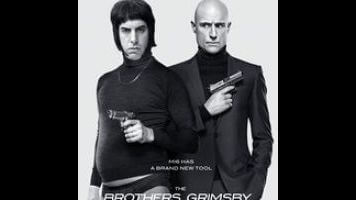Sacha Baron Cohen obviously holds certain strong beliefs about what constitutes good comedy—a willingness to risk offense or disgust, for one, and an intense commitment to creating distinct characters for another. Perhaps less heralded and more technical is his clear dedication to the art of brevity. In contrast to the Judd Apatow style of letting comic narratives breathe, or the Adam McKay style of letting certain improv runs take films on (sometimes brilliant) digressions, Cohen’s longest film as a comic lead—Ali G Indahouse, which didn’t receive a theatrical release in the United States—still clocks in under 90 minutes. This makes particular sense for projects like Borat and Bruno that hybridize sketch comedy and documentary and probably couldn’t sustain themselves for longer. But as Cohen has moved on to more traditional fiction features like The Dictator and now The Brothers Grimsby, his seeming dedication to both outlandish characters and extremely brief running times remains—and sometimes to the detriment of his material.
Simple enough, yet the movie’s scant 83 minutes dictate that The Brothers Grimsby proceed impatiently; the movie feels cut to fit the running time, rather than for the effectiveness of either the story or the comedy. The brothers’ childhood is chopped up and parceled out in brief flashbacks throughout the movie, which makes sense for one key piece of plot information, but also perversely denies the audience easy emotional inroads. On a more technical level, several comic scenes end abruptly, as if the punchline or the kicker has been cut off. Director Louis Leterrier was probably hired for the Sebastian side of the movie, to lend faux-authenticity to the movie’s knowingly jumped-up version of spy craft. His contribution to the movie’s freneticism, particularly during the extended POV action sequence that opens the film, is clearly intentional, but it doesn’t add much when the movie shifts to comic set pieces rather than semi-ironic action bits.
Given all of that, it’s almost impressive that The Brothers Grimsby works as well as it does—which is to say, intermittently and likably. Cohen’s social commentary is limited this time around to making some light points about the scapegoating and abandoning of lower-class “scum,” as Grimsby’s football hooligans are referred to at one point. But Cohen has a great feel for gags of squalor. The town of Grimsby, like Borat’s Kazakhstan, is a real place so heavily caricatured that it initially sounds like something Cohen made up; in the film, a sign boasts of its sister city, Chernobyl. It’s a little mean, but an early sequence where Nobby happily totes a mattress through the streets to the tune of Blur’s “Parklife” feels downright affectionate. (The film evens the score on 1994 Britpop by scoring a later scene with “Cigarettes & Alcohol” by Oasis.)
There’s also a hilarious moment pitting some of the town’s smaller hooligans against an army of more polished soldiers—but like several of the movie’s best gags, it’s oddly truncated. With such relentless cutting, big laughs brush up against hacky jokes, as well as jokes so hacky they almost seem bold. A sucking-out-the-poison bit, for example, is taken to such an extreme that it may well do the world a real courtesy by killing all future sucking-out-the-poison bits. (The same cannot be said for, say, the mistaking-a-fat-person-for-a-pregnant-person gag.) That willingness to go too far is sometimes funnier than the jokes themselves; it’s hard to understand why Cohen and his cowriters decided to stage the world’s most elaborate and explicit elephant-sex gag (some kind of insane desire to show up The Love Guru?), but it takes on a kind of deranged grandeur in its disgusting pointlessness.
Eventually, though, The Brothers Grimsby runs out of room to fully work as a hit-or-miss comedy—and perhaps most disappointing, doesn’t reserve any of its hits for co-stars Isla Fisher, Rebel Wilson, Gabourey Sidibe, and Penelope Cruz; it’s a great, diverse female cast assembled to do not very much. It may seem counterintuitive to suggest that a scattershot Sacha Baron Cohen movie would work better if it rambled on longer, and maybe it’s Cohen’s aversion to easy structure that enables his more gonzo leanings. It might be fun, though, to find out for sure.


 Keep scrolling for more great stories.
Keep scrolling for more great stories.